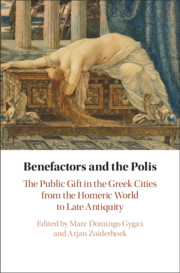 Benefactors and the Polis
Benefactors and the Polis The Limits of Generosity in Homer
from Part I - Benefiting the Community in Early Greece
Published online by Cambridge University Press: 21 January 2021
Against the common view that the creation of obligations through generosity in gift-giving and hospitality is a pervasive feature of the Homeric world and an antecedent of the classical and later culture of euergetism and benefactions, a survey of the epic evidence shows that this type of generosity is in effect confined to ‘international’ relations. Within Homeric communities, ‘gifts’ are almost always forms of payment for services rendered or tributes to those of higher status, and the flow of wealth is from the community to the elite more than vice-versa. The origins of public benefactions therefore do not lie in a culture of gift-giving but in an ideology of ‘public service’ owed by the elite to the community. In Homer, such service is ideally performed in war, counsel and the administration of justice, but as political and military changes reduced the scope for elite performance in these arenas while public spending needs increased during the archaic period, the community increasingly came to expect financial services instead from the elite.
To save this book to your Kindle, first ensure no-reply@cambridge.org is added to your Approved Personal Document E-mail List under your Personal Document Settings on the Manage Your Content and Devices page of your Amazon account. Then enter the ‘name’ part of your Kindle email address below. Find out more about saving to your Kindle.
Note you can select to save to either the @free.kindle.com or @kindle.com variations. ‘@free.kindle.com’ emails are free but can only be saved to your device when it is connected to wi-fi. ‘@kindle.com’ emails can be delivered even when you are not connected to wi-fi, but note that service fees apply.
Find out more about the Kindle Personal Document Service.
To save content items to your account, please confirm that you agree to abide by our usage policies. If this is the first time you use this feature, you will be asked to authorise Cambridge Core to connect with your account. Find out more about saving content to Dropbox.
To save content items to your account, please confirm that you agree to abide by our usage policies. If this is the first time you use this feature, you will be asked to authorise Cambridge Core to connect with your account. Find out more about saving content to Google Drive.